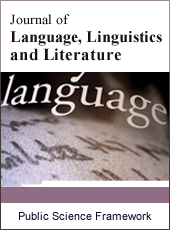Journal of Language, Linguistics and Literature
Articles Information
Journal of Language, Linguistics and Literature, Vol.2, No.1, Feb. 2016, Pub. Date: Jan. 25, 2016
The Zoo Story: Regeneration Through Communication
Pages: 8-13 Views: 3844 Downloads: 4070
[01]
Sayed Salahuddin Ahmed, Department of English, College of Arts & Science, King Khalid University, Muhayil Asir, Kingdom of Saudi Arabia.
A critical analysis of The Zoo Story reveals that under the absurd, grim, pessimistic and violent cover, the play sparks illumination of hope and positivism. This article endeavours to establish that the play carries a strong message for reconciliation of the compartmentalized modern society. It also examines how the playwright delivers the message through experimentation on communication and violence in order to create a ‘teaching emotion’ to push the higher class to endorse existence and needs of the vulnerable lower class.
Absurd, Regeneration, Communication, Violence, Isolation, Optimism, Nihilism, Kindness, Cruelty
[01]
Albee, Edward. The Plays. Vol-I. New York: Coward, McCann & Geoghegan, 1981.
[02]
Bailey, L. M. S. Absurdly American: Rediscovering the representation of violence in the zoo story. Edward Albee A Casebook. New York: Routledge, 2005.
[03]
Esslin, Martin. Introduction to Penguin Plays - Absurd Drama. Penguin, 1965
[04]
Boyle, T. Coraghessan. Tortilla Curtain. USA: Penguin, 2001.
[05]
Cohn, Ruby. Edward Albee. Minneapolis: University of Minnesota Press, 1969.
[06]
Coy, Stephen. Drama for Students. Paris: Gale, 1997.
[07]
Debusscher, Gilbert. Edward Albee: Tradition and Renewal. Trans. by Anne D. Williams. Brussels: American Studies Center, 1967.
[08]
Gofoerth, Christina. Edward Albee: A Brief Biography. Paris: Gale, 1972.
[09]
Gussow, Mel. Edward Albee. New York: Rutledge, 1998.
[10]
Johnson, C. E. In defense of Albee. The English Journal, 1968.
[11]
Mann, Bruce J (ed). Edward Albee: A Casebook. New York: Rutledge, 2003.
[12]
Meyer, R. Language: Truth and Illusion in “who’s afraid of Virginia Woolf?”. Educational Theatre Journal, 20, 60-9. 1968.
[13]
Miller, G. Albee on death and dying: “Seascape” and “the lady from Dubuque”. Modern Language Studies, 16, 149- 60. 1986.
[14]
Phillips, Michael. Goodman takes on Albee's harsh concept in Zoo Story. Tribune critic, Oct 24, 2003
[15]
Rénaux, Sigrid P. M. L. S. The opposing forces in Albee’s The Zoo Story.
[16]
Roudane, Matthew C. Understanding Edward Albee. SC: University of South Carolina Press, 1987.
[17]
Rutenberg, Michael E. Edward Albee: Playwright in Protest. New York: DBS Publications, Inc., 1969.
[18]
Shmoop. http://www.shmoop.com/the-zoo-story/language-communication-quotes-1.html
[19]
Stenz, Anita Maria. Edward Albee: The Poet of Loss. Paris: Mouton Publishers, 1978.
[20]
Sykes, C. A. Albee’s Beast Fables: “The zoo story” and “a delicate balance”. Theatre Journal, 1973.
[21]
Thomiszer, C. Child’s play: Games in “the zoo story”. College Literature, 1982.
[22]
Wasserman, Julian N. (ed). Edward Albee: An Interview and Essays. University of St. Thomas, 1983.
[23]
Wolfe, P. The social theater of Edward Albee. Prairie Schooner, 39, 248-62. 1965.
[24]
Woods, Linda L. “Isolation and the Barrier of Language in The Zoo Story" in Research Studies, Vol. 36, 1968.

ISSN Print: 2381-7054
ISSN Online: 2381-7062
Current Issue:
Vol. 6, Issue 1, March Submit a Manuscript Join Editorial Board Join Reviewer Team
ISSN Online: 2381-7062
Current Issue:
Vol. 6, Issue 1, March Submit a Manuscript Join Editorial Board Join Reviewer Team
| About This Journal |
| All Issues |
| Open Access |
| Indexing |
| Payment Information |
| Author Guidelines |
| Review Process |
| Publication Ethics |
| Editorial Board |
| Peer Reviewers |


